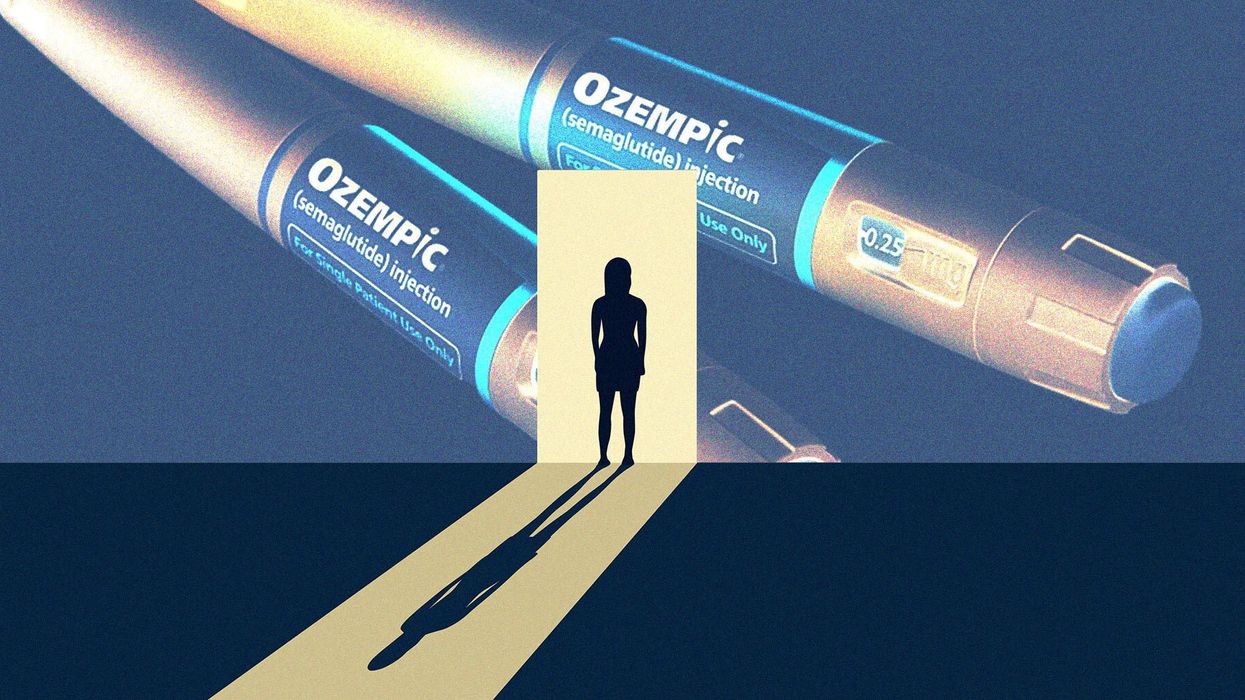Is Ozempic Changing the Conversation Around Body Image?
An unflinching look at a friend’s journey with Ozempic and how it has altered the way we talk about weight loss.

“I found a medical spa outside of LA, I won’t say where, but I heard about it through word of mouth from a modeling agent,” my former coworker Brian* divulges over Zoom. “If you want to know anything about beauty treatments, ask a modeling agent. They know the best places with the cheapest rates.” Halfway through Brian’s two-and-a-half months of Ozempic treatment, he’s already close to hitting his 20-pound weight loss goal. Since Brian isn’t a diabetic or pre-diabetic, I am curious to find out how he got his hands on this hyped-up, highly-coveted weight-loss medication. As a self-proclaimed “double Virgo,” he deftly explains to me the ways name-brand semaglutides like Ozempic, Wegovy, and Mounjaro “help transform the way the body absorbs sugar and turns it into fat.” An FDA-approved diabetes medication, Ozempic has an added component of insulin regulation that helps suppress appetite by simulating a sense of satiation in the brain at all times. As the FDA began cracking down on non-branded semaglutides offered in compounding pharmacies, the medical spa offered to write Brian an Ozempic prescription. Brian’s GP verified that the semaglutide from compounding pharmacies certainly works, but “not as well.” When I asked Brian why he chose Ozempic over the others, he flippantly answered, “I’m a brand-name queen.”
This conversation is a perfect embodiment of your typical happy hour gossip in Los Angeles (minus the cocktail for whoever is on Ozempic, as the drug curbs the desire for alcohol). As Brian gossips about how “those annoying girls from the office are all on those off-brand med spa semaglutides,” he adds, “the Ozempic pen has a way better applicator.” I respond, “Literally so embarrassing for them.” Aware of the cliché nature of our conversation, our speech unconsciously shifts into a late 90s valley girl accent—a tone that evokes hair-twirling and gum chewing. Weight loss, name brands, under-the-counter prescriptions—there’s something vaguely retro about the whole thing. Without shrouding Brian’s endeavor through a filter of “wellness” or “health,” something about this forthright conversation feels transgressive.
"To be thin for the sake of being thin—why would that require medical intervention? Seems like this is just a way for these pharmaceutical companies to make a ton of money on people’s insecurities."
My conversation with Brian typifies one end of the conversational spectrum around the topic in Los Angeles. In other circles, the mere mention of Ozempic elicits disdain. A friend of mine explained, “I understand people that use it for diabetes or if they’re suffering from complications related to obesity, but people just taking it to lose a bit of weight—it feels kind of fucked up.” When I ask her to elaborate, she says, “It just seems scary and unhealthy to lose weight so quickly. Just to lose like a few pounds? To be thin for the sake of being thin—why would that require medical intervention? Seems like this is just a way for these pharmaceutical companies to make a ton of money on people’s insecurities.” She’s not the only one who feels this way. While obviously no one objects to Ozempic’s use for those suffering from medical complications, the extracurricular use of the drug for weight loss has sparked a debate that has unfolded over countless op-eds and articles, this one adding a drop in an already overflowing bucket. In essence, some see Ozempic as a prescription eating disorder. They warn it’s a regressive return to the historically classist, racist, and ableist ideals of “thinness” as the aspirational standard of beauty.
When I ask Brian if he’s run up against this type of judgment surrounding his use of Ozempic, he groans dramatically, “That’s been really pissing me off.” He elaborates, “I am not ashamed of taking Ozempic, I talk about it very openly with people in my life, but what I can’t stand is the judgment. I’m not an addict, I’m not trolling the streets for Oxy, I’m just doing this for myself. It’s nobody’s place to judge.” The dissonance between Brian’s viewpoint and the one above has made one thing clear: this conversation isn’t just about Ozempic. It’s about our society’s relationship to weight, thinness, and attaching moral significance to size. Will the Ozempic craze run its course like Phen-Fen in the 90s, or will it become so ubiquitous that body size will eventually be viewed as a choice?
While I am well aware that thin privilege and media-endorsed beauty standards are far from inclusive, interpersonal conversations about weight have reached a type of fever pitch of public conscientiousness in the last ten years. Overall, this has been a vast improvement—we know it’s not polite to comment on someone’s weight, to compliment thinness, or to encourage weight loss. We embrace body diversity and call out brands that don’t. More and more brands promote body positivity, and we’ve done work to destigmatize descriptors like “fat” or “curvy.” There was a distinct pivot from the heroin-chic, low-rise pants, rail-thin beauty standards of Y2K fashion, and Atkins and Jenny Craig receded into the annals of Boomer history. Cultural conversations shifted from aspirational body goals to an emphasis on inclusion and acceptance. In short, it became gauche to talk about weight loss or dieting, but combined with a culture that still prioritizes thinness, there has developed a kind of manic dissonance in the way we talk to each other about weight.
In tandem with this shift, and with the recent phenomenon of “therapy speak,” there has also been a marked rise in what I would like to call “self-acceptance bullies.” We all know one. The kind of person that, if you express any discontent about your appearance (i.e., “I feel so bloated today,” “My forehead wrinkle is getting deeper,” “I hate my double chin”), this person will tell you you’re beautiful with such intensity that it borders on aggression. You have to love yourself no matter what! While the sentiment of self-compassion comes from a good place, it feels more like a scolding than support, as though a desire to change or self-modify is antithetical to self-esteem.
While self-acceptance is obviously ideal, the question is whether it can also live peacefully beside an individual’s desire to change their bodies—and whether this desire can be truly divorced from problematic societal pressures and ideals. Unfortunately, as a society, we are clearly not there quite yet. Post-Y2K “sugar-free” and “South Beach” dieting fads, our society’s anorexia morphed into orthorexia—a pathological obsession with health. I would never go so far as to say all the health and wellness crazes are all disguised eating disorders, but I will say they offer a shield of protection against the self-acceptance bullies and judgment from anti-diet culture that makes that lifestyle appealing to those with covert eating disorders. Many wellness crazes, from juice cleanses to paleo to keto, are incredibly effective for this purpose in that they center around strict food restrictions. However, when Ozempic entered the chat, suddenly, we had a form of food restriction with no pretense of health (outside of actual treatment for diabetes and obesity). In fact, it is blatantly unhealthy in many ways, with several articles warning about side effects from stomach paralysis (gastroparesis) to “Ozempic face.” But with its promise as a weight loss “silver bullet,” it feels like many people have simply dropped the pretense that they were aiming for anything healthy to begin with.
"I follow the instructions militantly, so I don’t drink or eat any fatty acids, bad oils, or complex carbohydrates because they make you seriously ill."
Without sugarcoating the experience with any pretense of “wellness,” Brian speaks with unflinching honesty about the emotional and physical toll of taking Ozempic: “The process is really taxing. There’s a lot of fatigue from the calorie deficit. You get headaches. I follow the instructions militantly, so I don’t drink or eat any fatty acids, bad oils, or complex carbohydrates because they make you seriously ill. I ate some peanut butter pretzels from Trader Joe’s and I was bedridden in excruciating pain for nearly seven hours. You’re terribly thirsty all day and you don’t drink alcohol. Some people who don’t follow the instructions may find they aren’t losing any weight, or worse, get seriously ill. You have to take the instructions very seriously, and after paying $973 a pen, you better believe I’m going to be snatched.” Clearly, Ozempic is not quite the easy “cheat code” to weight loss that the discourse would suggest. As an intelligent and responsible person, Brian approaches the process with medical safety as a priority.
I ask Brian directly if he feels the Ozempic craze is at odds with the sweeping cultural discourse about body positivity. He emphatically disagrees. “First of all, I’m a body positivity advocate as I believe you should do whatever is going to make you happy. You celebrate whatever size you want to be, as curvy as you want to be. If you love your dad bod and that’s your vibe, or you’re a gay bear and belly-to-belly frottage is what does it for you—you go, girl.” In Brian’s case, he went into 2020 very trim and fit, and like many people stuck inside without access to the gym, he put on 20-30 pounds over the course of the pandemic and struggled to return to his pre-pan figure. “After lockdown ended, I started going back to the gym, eating healthy, and getting back into my routine, but it felt impossible to lose that last 10-20 pounds, I just wanted to feel comfortable in my body again, and to fit into my clothes again.” Will it ever be totally possible to untangle societal pressure to be thin from and a personal desire to drop a few pounds? On a superego level, is the “it’s okay for other people, but it’s not okay for me” attitude towards self-acceptance just another internalized form of body shame? It’s impossible to say. Personally, I choose to trust Brian about what’s best for him. He knows himself better than me—and it’s undeniable that it’s not my place or anyone else’s to bully him to accept a version of himself he doesn’t feel comfortable with.
After having so many conversations about the Ozempic craze, I noticed the drug itself rarely remains the topic of discussion. Instead, Ozempic seems to be a conversational catalyst setting off the Rube Goldberg machine of triggers society has around body image, beauty standards, thin privilege, access, and shame—all topics that have left us wounded, highly judgemental, and over-prescriptive when it comes to conversations about weight. While we’ve all been trundling upstream in pursuit of self-acceptance, the emergence of an easy, quick fix for thinness quickly separated the wheat from the chaff when it came to exposing who was practicing and who was just preaching.
At the end of our call, Brian adds, “If someone you know is on a particular journey with their weight, stop judging them. Stop treating them like what they’re doing is bad. It’s my journey, not yours, and it’s not your place to judge.” However you feel about the larger cultural discourse, it’s indisputable that someone else’s choices regarding their body are simply not fair game. Wherever you fall on the conversational spectrum around the Ozempic craze, it’s clear that society’s process of grappling with body image and how to talk about it is far from over. From how deeply divisive I’ve seen every conversation about this shiny new weight loss craze become, it’s also clear that we haven’t made as much progress as we give ourselves credit for on the issues of body positivity and acceptance.
Can we condemn any individual for wanting to alter their appearance, be that weight loss, weight gain, muscle tone, or a myriad other choices? No. Can we ever untangle a desire to be thin with society’s thin privilege? As long as that thin privilege exists, no. Is there an economic aspect to privilege and access to healthy food, gyms, and drugs like Ozempic? Absolutely. But it’s clear that Ozempic itself is a societal symptom, not the real problem—it merely holds a mirror to the chaos of cognitive dissonance about body image that’s been simmering under the surface of polite society for decades.
*We've chosen to keep our interviewee's name confidential.




